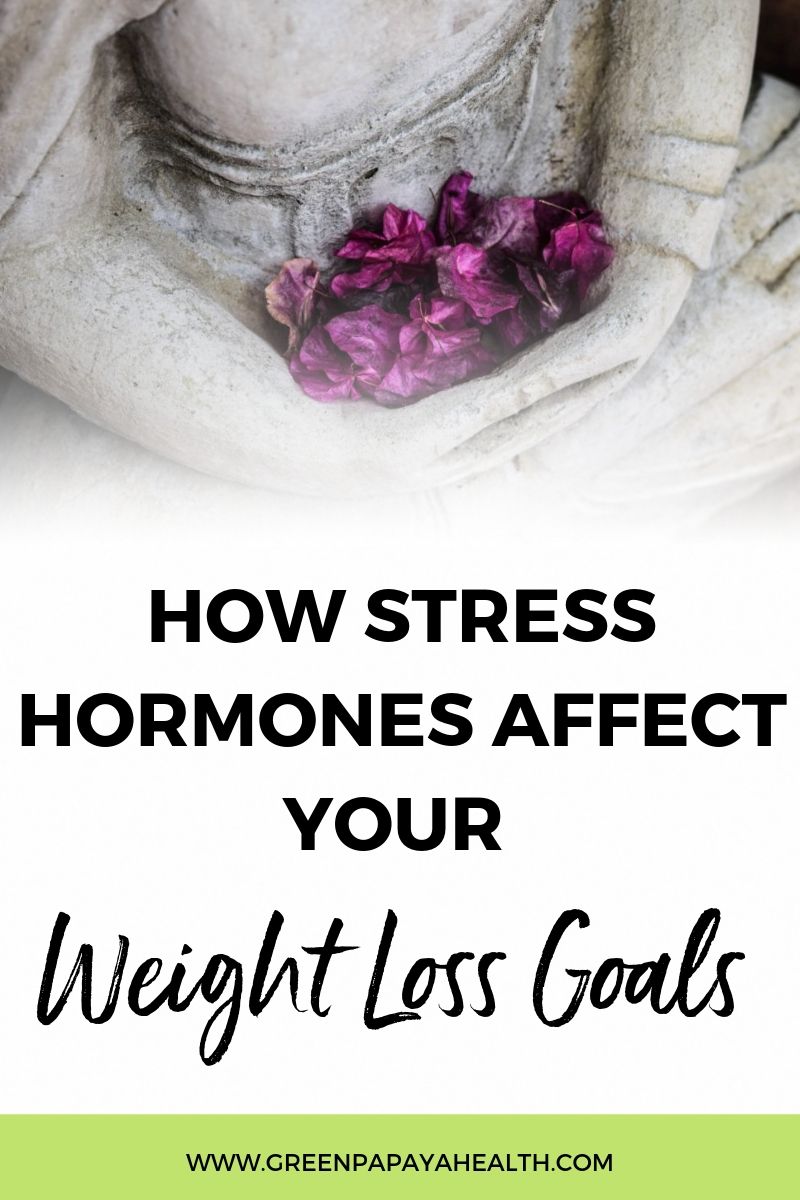You probably wouldn’t be surprised to know that more stress and stress hormones promote weight gain, would you?
But what exactly is stress, and how does it keep you from your weight loss goals?
In fact, there are actually many links between stress hormones, environmental toxins and weight. We’ll talk about six major reasons how stress hormones keep you from your weight loss goals. These include the effect stress has on digestion and gut health, inflammation and the immune system. Stress can cause cravings, increased appetite, and “stress eating.” It can promote fat storage around the waist with its effect on insulin sensitivity. Stress can also be mood-busting and demotivating, not to mention how it worsens sleep.
All of these can work to keep you from hormone balance and meeting your weight loss goals.
Let’s go over the effects of stress and stress hormones, and exactly how they all tie into weight loss. Then we’ll end off with two strategies (and several of my best tips) how to manage stress.
Because, as you know, weight loss isn’t just about calories.
WHAT IS STRESS?
When you hear the word “stress” do you think it’s dangerous or unhealthy?
In actual fact, stress itself is a totally normal response to a sense of danger. It can be your friend or foe.
You usually can’t fully control it. It’s your body’s way of protecting you with the “fight or flight” reaction. It can help you survive.
Stress can help you to become more focused and have energy when facing an immediate threat. This infrequent short-term stress can help you to run to your kid when (s)he is hurt, or avoid a collision. It can even help you to meet deadlines or get to appointments on time when running late. It’s also what makes some people enjoy roller coasters or dangerous activities (skydiving anyone?). Have you heard the term “adrenaline junkie?”
These are examples of infrequent short-lived stress called “acute” stress, or even “good” stress. And when the situation is over, the stress fades and your body goes back to normal. Ideally, this is how stress should be, infrequent and short-lived. The problem is that in today’s society, many people feel stress often, and for a long time. It’s neither infrequent, nor short-lived. It’s more “constant” or “chronic.”
This is different.
This can be from having or caring for someone with a major illness, or long-term relationship problems. Maybe you have a crummy and long commute to a not-so-awesome job every single day.
And that chronic stress (“bad” stress) can affect you in so many ways. It can affect your digestion, moods, and sleep. And, not surprisingly, it can affect your ability to lose weight. In fact studies show that chronic stress is associated with obesity and metabolic disease. And this is especially true for women. Women are at greater risk for stress-induced emotional eating, and obesity.
This kind of stress can negatively affect your digestion, your mood, your health…and keep you from your weight loss goals.
SYMPTOMS OF STRESS
When your body senses danger (real or imagined), it immediately reacts with the “fight or flight” reaction to help you…well, “fight” or “flee”.
Things essential for survival are prioritized. Things like perception, decision making, and energy for your muscles. The other “rest and digest” functions are put on the backburner until the stress levels start fading.
You probably know how stress affects you. Do you get cravings or indigestion? Do you feel more aches and pains, or get sick? Do you have trouble sleeping? Do you have more difficulty losing weight?
Let’s touch on the physical effects of stress, and then dig into how these effects can keep you from your weight loss goals.
STRESS RESPONSE – NERVES AND HORMONES
Stress-related symptoms are from the physiological effects of stress. Basically, how it affects our nervous system and hormones.
Both of these have profound effects on the body because they’re trying to help you save your (or someone else’s) life.
First up, the nervous system. The “fight or flight” part of your nervous system that is activated by stress is called the “sympathetic” nervous system. This part of your nervous system is usually (ideally) nice and quiet. It’s on “standby” until needed.
On the other hand there is the “rest and digest” part of your nervous system called the “parasympathetic” nervous system.
So, as you can imagine, when you have chronic stress your body isn’t doing much resting or digesting. And both of these are important for optimal health…and weight.
Secondly, let’s talk stress hormones. Have you heard of “cortisol” and “adrenaline?” These hormones are released by your adrenal glands. Adrenal glands look like little walnuts on top of each kidney, and they release a number of hormones, including these stress hormones.
STRESS HORMONES
When you perceive danger (real or imagined), this starts a hormone cascade that moves from your brain to your adrenal glands. It’s basically like when a bunch of people are in a circle and they’re passing the ball to the person beside them. But with stress hormones.
First, a part in the brain called the “hypothalamus” gets your nervous system ready. It also releases a hormone to trigger the next hormone in the cascade. (Here’s the first pass of the ball.)
Second, when the pituitary gland (also in the brain) gets that hormone, it releases a different hormone to trigger the next hormones in the cascade. (Here’s the second pass of the ball.)
Third, when your adrenal glands (on your kidneys) get that signal, they release the stress hormones cortisol and adrenaline. Here’s where things get interesting.
The fancy name for this connection between the brain’s hormones and adrenal hormones is called the “hypothalamic-pituitary-adrenal axis”, or the HPA Axis.
There is more and more research that shows a link between a dysregulation (improperly functioning) of the HPA Axis, and its association with insulin resistance and abdominal obesity. And, ideally, you want to minimize insulin resistance and abdominal obesity, right?
The stress hormone cortisol affects many things in our bodies. Things like digestion and gut health, inflammation. hunger hormones, insulin release and sensitivity, mood, and sleep. All of these that are affected by stress hormones can also affect your weight.
STRESS HORMONES AND WEIGHT
We now see that there are many, many effects that stress hormones, mainly cortisol, have on your body. Including the link that people with abdominal obesity tend to have higher cortisol levels.
Let’s dive into each one and see how stress hormones keep you from hormone balance and weight loss goals.
1 – Poor Digestion and Gut Health
As mentioned already, being in a state of stress puts digestion on the back burner. This is because your body is ready to “fight or flee,” rather than “rest and digest.”
One of the most obvious impacts stress has on digestion is “transit time.” You may notice that stress can either quickly speed up how fast your food moves through you (diarrhea). Or, it may slow it down quite a bit (constipation). Neither one of these is ideal.
So, even if you’re eating a variety of nutrient-dense whole foods, you may become nutrient deficient! And proper nutrition is needed at the best of times, let alone when you’re stressed and trying to lose weight.
New research is also showing the impact that stress has on our friendly gut microbes. We’re just beginning to understand the influence that our gut microbes have on all aspects of health, including weight loss. It may be surprising to know that there seems to be a link between stress and gut microbes (in animals). Seriously!
Stress is also linked with tiny holes or “leaks” in your digestive tract. This means that incompletely digested food particles can get into your body through these leaks. This can cause a ton of inflammation.
Which leads us to the second major way stress keeps you from your weight loss goals.
2 – Inflammation and immune system dysregulation
Guess where 80% of your immune system is located?
Right around your digestive tract!
So, you can imagine if chronic stress is messing with your digestion, it’s going to also mess with your immune system.
More and more research is suggesting that inflammation is part of many chronic diseases. When you’re chronically stressed, this affects your immune system which is supposed to control inflammation. It can make your immune system either hypervigilant, or less-responsive. And both of these can keep you from reaching your weight loss goals.
If your immune system is hypervigilant, you can develop high inflammatory levels.
If your immune system is less-responsive, it can allow your body to get sick more often, and stay sick longer.
For optimal health, and the ability to lose weight, you want your immune system to work properly (not too high, nor too low).
3 – Cravings, increased appetite, and “stress eating”
When you’re stressed do you reach for celery? Or do you prefer fatty or sugary snacks?
Many people tend to eat more food, particularly comfort food. Things that tend to be fatty and sugary. And there is science to back this up.
Scientists are now looking at interactions between stress hormones and the “hunger” and “fullness” hormones.
I don’t even have to tell you how this is going to keep you from your weight loss goals.
4 – Insulin sensitivity
Stress also increases your blood sugar, to make sure that your muscles have the fuel (sugar) they need to “fight” or “flee.” And if your muscles are not working and using up that excess blood sugar (i.e. you’re not running for your life), your body secretes insulin to re-absorb that sugar into your cells.
This increase in both cortisol and insulin promote both insulin resistance and fat storage. Especially around the middle.
5 – Mood-busting and demotivating
Stress can not only bring down your mood, but that can also be terribly demotivating. When you’re feeling stressed, you may start feeling moody. You may also have less motivation to do the healthy weight loss activities that you really want to do.
If you’re down in the dumps and not motivated to prepare healthy meals or snacks, or get some exercise, then you’re less likely to do those things.
And we all know how important they are for weight loss.
6 – Negatively affects sleep
Cortisol is part of your natural sleep-wake cycle. Under normal (non-stressed) conditions, cortisol levels would increase before waking, and slowly drop during the day.
And this makes sense, because we know that it helps increase mental clarity as well as blood sugar to fuel your muscles. And we need mental clarity and to move our muscles, especially when we are awake.
But we also need this effect to “wear off” by the end of the day so we can start getting tired and relaxed enough to get a good night’s sleep. In other words, in the evenings, we want to start more resting and digesting.
And getting enough sleep is probably a more common reason why people don’t reach weight loss goals than most people think. Science is showing the links between not getting enough quality sleep and obesity.
Now that we’ve gone through six major reasons how stress hormones keep you from your weight loss goals, let’s talk about what the heck you can do about it.
STRESS-REDUCING TIPS
I’d love to help you manage your stress better so you can balance your hormones, feel great and meet your weight loss goals.
There are really two main strategies to go about reducing your stress.
First off, you can reduce the amount of stress put on you by re-balancing some demands. Try:
- Saying “no”;
- Getting more support;
- Delegating to someone else;
- Re-negotiating deadlines that seem unreasonable;
- When working, focus on just one thing at a time (don’t multi-task).
Secondly, since you can’t (and maybe don’t want to) completely remove stress from you life, you want to learn to deal with it better. You can improve your personal stress tolerance by trying to:
- Have some fun and laugh;
- Make time for people (and pets) you love;
- Get more, better-quality sleep;
- Be mindful and live more “in the moment”;
- Have one or two cups of green tea (which has been shown to lower stress levels);
- Do light exercise most days per week (e.g. yoga, swimming, or tai chi);
- Go for a walk outside;
- Spend more time in nature;
- Eat a nutrient-rich diet;
- Meditate or deep breathing;
- Relax every evening (e.g. have a bath or read a book);Listen to soothing music;
- Do a “brain dump” every night before bed where you just make notes of things you’re keeping track of in your head so you can relax more;
- Treat yourself to a massage, nice meal, or pedicure.
SUMMARY
Stress has six major effects that can keep you from balancing your hormones and meeting weight loss goals. It affects digestion and gut health, inflammation and the immune system. Stress can cause cravings, increased appetite, and “stress eating.” It can promote fat storage around the waist with its effect on insulin sensitivity. Stress can be mood-busting and demotivating, not to mention how it worsens sleep.
All of these effects can keep you from your weight loss goals. Definitely try some of the many ways to deal with stress, but also try to reduce some of the causes of stress in your life.
Your mind and body will thank you!

REFERENCES
Brzozowski B, Mazur-Bialy A, Pajdo R, Kwiecien S, Bilski J, Zwolinska-Wcislo M, Mach T, Brzozowski T. Mechanisms by which Stress Affects the Experimental and Clinical Inflammatory Bowel Disease (IBD): Role of Brain-Gut Axis. Curr Neuropharmacol. 2016;14(8):892-900.
LINK: https://www.ncbi.nlm.nih.gov/pubmed/27040468
Chao AM, Jastreboff AM, White MA, Grilo CM, Sinha R. Stress, cortisol, and other appetite-related hormones: Prospective prediction of 6-month changes in food cravings and weight. Obesity (Silver Spring). 2017 Apr;25(4):713-720. doi: 10.1002/oby.21790.
LINK: http://onlinelibrary.wiley.com/doi/10.1002/oby.21790/full
Chen WQ, Zhao XL, Hou Y, Li ST, Hong Y, Wang DL, & Cheng YY. Protective effects of green tea polyphenols on cognitive impairments induced by psychological stress in rats. Behav Brain Res. 2009 Aug 24;202(1):71-6.
LINK: http://www.sciencedirect.com/science/article/pii/S016643280900165X
Clarke G, Stilling RM, Kennedy PJ, Stanton C, Cryan JF, & Dinan TG. Minireview: Gut microbiota: the neglected endocrine organ. Mol Endocrinol. 2014 Aug;28(8):1221-38. doi: 10.1210/me.2014-1108.
LINK: https://www.ncbi.nlm.nih.gov/pubmed/24892638
Fernandez-Rodriguez E, Stewart PM & Cooper MS. The pituitary–adrenal axis and body composition. Pituitary 12 (2009):105–115 DOI 10.1007/s11102-008-0098-2
LINK: https://www.ncbi.nlm.nih.gov/pubmed/18324475
Hewagalamulage SD., Lee TK., Clarke IJ. & Henry BA. Stress, cortisol, and obesity: a role for cortisol responsiveness in identifying individuals prone to obesity. Domest Anim Endocrinol. 2016;56 Suppl:S112-20. doi: 10.1016/j.domaniend.2016.03.004.
LINK: http://www.domesticanimalendo.com/article/S0739-7240(16)30034-0/abstract
Incollingo Rodriguez AC, Epel ES, White ML, Standen EC, Seckl JR & Tomiyama AJ. Hypothalamic-pituitary-adrenal axis dysregulation and cortisol activity in obesity: A systematic review. Psychoneuroendocrinology. 2015 Dec;62:301-18. doi: 10.1016/j.psyneuen.2015.08.014.
LINK: http://www.psyneuen-journal.com/article/S0306-4530(15)00887-2/abstract
Kolbe, I., Dumbell, R. & Oster, H. (2015). Circadian Clocks and the Interaction between Stress Axis and Adipose Function. Int J Endocrinol. 2015:693204. doi: 10.1155/2015/693204.
LINK: https://www.ncbi.nlm.nih.gov/pmc/articles/PMC4426660/
Lucassen EA, Cizza G. The Hypothalamic-Pituitary-Adrenal Axis, Obesity, and Chronic Stress Exposure: Sleep and the HPA Axis in Obesity. Curr Obes Rep. 2012 Dec;1(4):208-215.
LINK: https://www.ncbi.nlm.nih.gov/pmc/articles/PMC3498460/?report=reader
Michopoulos V. Stress-induced alterations in estradiol sensitivity increase risk for obesity in women. Physiol Behav. 2016;166:56-64. doi: 10.1016/j.physbeh.2016.05.016.
LINK: https://www.ncbi.nlm.nih.gov/pubmed/27182047
Pasquali R, Vicennati V, Cacciari M & Pagotto U. The hypothalamic-pituitary-adrenal axis activity in obesity and the metabolic syndrome. Annual NY Academic Science, 1083, 2006;111–128. doi: 10.1196/annals.1367.009
LINK: http://onlinelibrary.wiley.com/doi/10.1196/annals.1367.009/pdf
Schorr M, Lawson EA, Dichtel LE, Klibanski A, Miller KK. Cortisol Measures Across the Weight Spectrum. J Clin Endocrinol Metab. 2015 Sep;100(9):3313-21. doi: 10.1210/JC.2015-2078.
LINK: https://www.ncbi.nlm.nih.gov/pmc/articles/PMC4570173/
Photo by Chris Ensey on Unsplash





